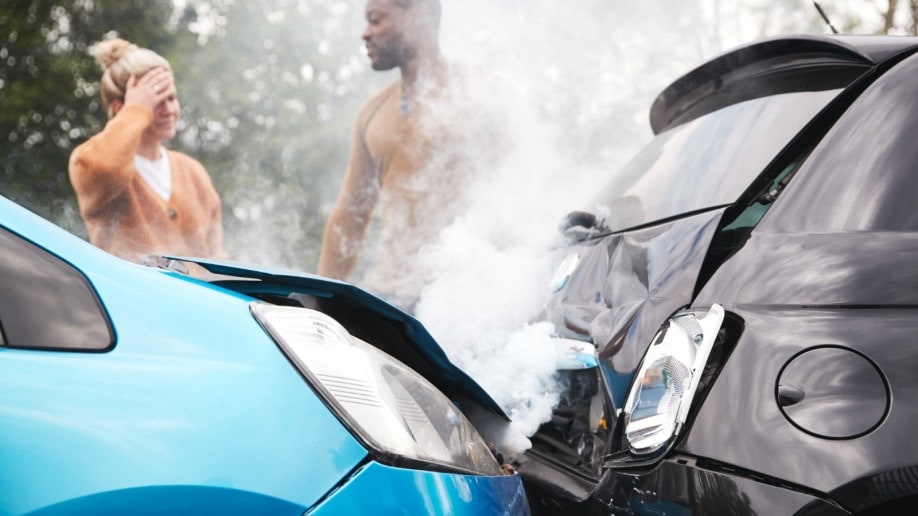Should I Drop Collision Insurance?
By Jennifer Brozic 07/20/2021 4:00pm

Dropping collision insurance or any other coverage that’s not required by law can help you save on your insurance premiums. But it can cost you if you’re in an accident: Without adequate coverage, you can get stuck paying for repairs out of pocket.
Deciding when to drop collision insurance isn’t an exact science, and it’s important to understand the risks before you do. Here are some things to consider that can help with your decision.
What Will Collision Insurance Cover?
Before you decide whether you want to keep collision insurance, it’s important to understand how it protects you. Collision coverage can help pay for repairs if your car is damaged in a crash with another car or a stationary object, such as a retaining wall or guard rail. Without it, you could be stuck with thousands of dollars in repairs that you would have to pay for out of pocket.
RELATED STORIES: Penalties for Driving Without Car Insurance by State
How Is Collision Coverage Calculated?
Your insurance company calculates the amount of money they’ll reimburse you based on your car’s actual cash value. That’s the amount the insurer will pay toward repairs, minus your deductible. Your deductible is the amount you have to pay before the insurance company pays.
You get to choose your car insurance deductible when you buy your policy. Deductibles for auto policies typically range from $100 to $2,500. And your insurance company will let you know what your options are when you apply.
When selecting your deductible, it’s important to choose an amount you can afford to pay if you need to file a claim. A lower deductible will minimize your out-of-pocket costs if you’re in an accident, but your premium will be higher. On the flip side, a higher deductible typically reduces your premium, but it increases the amount you have to pay when you file a claim.
When Is Collision Insurance Worth It?
Maintaining collision coverage can help protect your finances if you’re in a crash by paying for repairs to your vehicle. In general, it’s a good idea to have collision coverage if:
- You have a new(ish) vehicle. If your car is relatively new, chances are the value of your vehicle is significantly more than what you’d pay for your premium and deductible. So, the benefit of maintaining coverage would likely outweigh the cost. And it could save you thousands if you’re in an accident.
- You can’t afford to pay for repairs if you’re in an accident. Even if your car isn’t worth a ton of money, you may want to keep collision coverage if you wouldn’t be able to pay for repairs. But keep in mind that if the cost of the damage exceeds a certain percentage of the car’s value, the insurance company will declare it a total loss. And they’ll reimburse you for the actual cash value of the vehicle (minus your deductible), which may not be enough to repair it.
- You’re driving an older car you can’t live without. Even if you drive an old car, it might make sense to keep collision coverage on your aging vehicle if you wouldn’t be able to afford to replace it. “It may make more financial sense for somebody that’s in a paycheck-to-paycheck situation to keep the comprehensive and collision,” said John Espenschied, agency owner, Insurance Brokers Group.
When is Collision Insurance Not Worth It?
There’s no doubt that having collision coverage can save you a bundle if you’re in an accident. But there may be times when it doesn’t make sense to continue paying for car insurance collision coverage.
- Your car’s not worth much. “If you get down to the point where you don’t see a lot of value in the car, where if it ends up getting wrecked, you’re going to get a new car anyway,” you probably don’t need collision coverage, says Espenschied. But be sure you’re making your decision based on the market value of the car and not how old it is or how many miles it has. Use the Kelley Blue Book valuation tool to find out the fair price range for your vehicle.
- You can cover the cost of repairs out of pocket. If your car wouldn’t cost too much to repair and you can afford to pay for damages out of pocket, you might not need collision coverage. But if you have an expensive vehicle, the benefit of having coverage probably outweighs the cost of the premium.
Can I Drive Without Collision Coverage?
If you don’t have an auto loan or lease, you can drop collision insurance at any time. However, if you’re still paying off your auto loan or you’re leasing your vehicle, you need collision coverage.
“The lender is going to require proof, and if you don’t have it, they’ll force place collision insurance at an extremely high rate,” says Espenschied. If that happens, you’ll likely pay a lot more than if you had bought a policy on your own. So make sure you have coverage if you have a lease or loan
